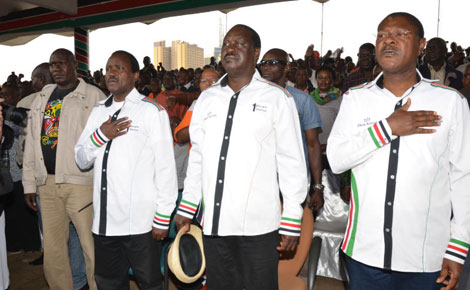×
The Standard e-Paper
Kenya’s Boldest Voice
 |
|
CORD principals Kalonzo Musyoka (left), Raila Odinga (centre) and Moses Wetang’ula during the Saba Saba rally at Uhuru Park on Monday. [Photo: BEVERLYNE MUSILI/STANDARD] |
Coalition for Reforms and Democracy (CORD) leaders have laid the road map through which 13 resolutions, which they unveiled during the Saba Saba rally at Nairobi’s Uhuru Park, will be implemented.
CORD has disclosed that its first move will be to ensure that the Independent Electoral and Boundaries Commission (IEBC) is disbanded and will not be allowed to handle the proposed referendum that was part of the resolutions.